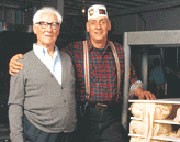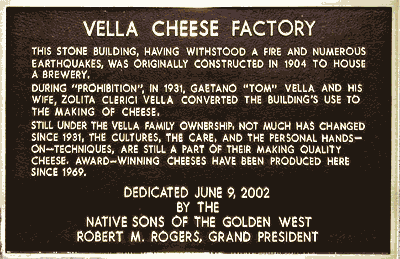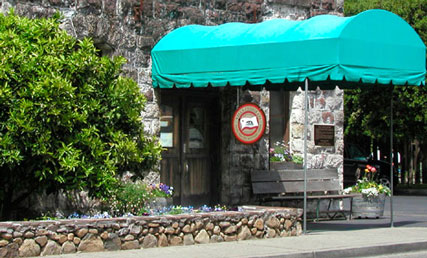Vella Cheese Company
made by hand since 1931
sustainably produced since 2003
The History of Vella Cheese
Since 1931, Vella Cheese has been a companion to the finest foods in the world. As an ingredient, sprinkled on top, or served alongside, the full fresh flavor and smooth creamy texture of Vella Cheese is guaranteed to satisfy.
The success
of Vella Cheese lies in the personal attention each day's production
is given. Quality starts in the pasture. Every cow is not the same.
Every day is not sunny; every blade of grass is not green and lush.
But, if you insist on the finest breeding of herds, the finest feeds,
the greatest care in milking and transporting the top grade milk, so
that you have the best possible natural raw material, you have set
the stage for super cheese. 
 What has built our reputation over the years since my father had his first conversation with the dairymen, has been our hour-to-hour personal attention. We're proud when you're pleased with our product. Ig Vella
What has built our reputation over the years since my father had his first conversation with the dairymen, has been our hour-to-hour personal attention. We're proud when you're pleased with our product. Ig Vella
Our Beginnings
In 1904, the sturdy stonewalled building that houses Vella Cheese was a built to house a brewery. This photo was taken in 1907. The building made it through the 1906 and other earthquakes, but bowed before the anti-alcohol movement and a later fire that destroyed the wooden third story and left the building in ruins.
Tom Vella had arrived in Sonoma in the early 1920s, and held various jobs with the Sonoma Mission Creamery, in which his brother, Joseph, held considerable stock. Tom built a reputation for hard work, honesty and a talent for making superior cheeses.
 In
1931, a group of dairymen called on Tom with an idea they had been
mulling over for a good spell. Would
Tom, they wanted to know, be interested in starting a cheese factory
of his own, if they guaranteed him all
the quality bulk milk he would need to operate it successfully. Bright,
ambitious and just a little weary of working for someone else, Tom
jumped at the opportunity.
In
1931, a group of dairymen called on Tom with an idea they had been
mulling over for a good spell. Would
Tom, they wanted to know, be interested in starting a cheese factory
of his own, if they guaranteed him all
the quality bulk milk he would need to operate it successfully. Bright,
ambitious and just a little weary of working for someone else, Tom
jumped at the opportunity.
Gathering together the best equipment available, in partnership with an equally experienced cheese maker, Tom put his management skills to work.
Growth
Success followed success, and Vella Cheese Company grew beyond the confines of the stone structure. As the United States entered the conflict which was to become World War II, Vella Cheese went into extra shifts and ran at full capacity around the clock.
After the War, in 1951, Tom moved the center of his cheese-making operation to the original building of the Sonoma Mission Creamery, across from the Plaza where the Bear Flag was first raised in 1846, and opposite the Sonoma Mission.
The Original Stone Building
In 1969, Tom moved the center of his cheese making operations back to the stonewalled building shown at the top of the page where it all started. Visitors to Sonoma soon discovered the building with its unique atmosphere and wheels of fresh and dry Jack cheese.
As the tourists went home, they spread the word about the marvelous "new cheese" they had tasted. It was not cheddar. It was not even orange. It was pale, and creamy, with an indescribably delicate flavor. This was the cheese created in the Gold Rush Days in Monterey by a Scot named David Jacks, whose name it carries today.
Vella
Cheese Today
Tom Vella knew a winner when it rolled across his counter, and his concentration and demand for the best possible quality brought jack production to its highest standards. When the Italian families demanded a quality grating cheese, Vella Cheese Company responded with a carefully aged and nurtured Dry Jack for which they are justly famous today. Tom turned the operation of Vella Cheese over to his children in 1981. His son, Ignazio "Ig" Vella has picked up where his parents left off. And today, two more generations of the Vella family work hard to insure that this tradition of quality and attention to detail continues.
While much has changed over the last seventy plus years, more has remained the same. The cultures, the care, the personal hands-on techniques, even the old curing rooms are the same. But most of all, the quality is the same that brought discriminating customers through the creamery doors all those years, and continues to make the little building on Second Street East a special stop for those who demand the finest.